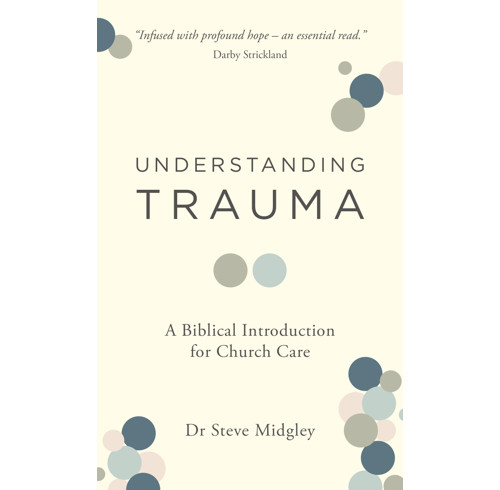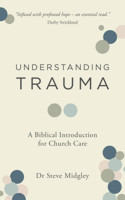
Guidance for churches on how to walk with wisdom and compassion alongside those who are struggling with trauma.
Many of us long to serve and be there for those who are suffering from trauma, but we don't know how to do so in a way that is caring and helpful.
This book enables Christians, and especially pastors, elders and ministry leaders, to understand what trauma is, and how it affects people, including their experience of church, so that we can lovingly support those who are suffering from it.
Author Steve Midgley trained as a psychiatrist before being ordained, served as Vicar of Christ Church Cambridge for 18 years and is now the Executive Director of Biblical Counselling UK. He writes with wisdom and compassion to summarise current understanding in this area, gives a biblical perspective, and makes lots of practical suggestions about how churches can be sensitive to, and be there for, those who have experienced trauma.
This book will help whole church communities to help and care for those who are struggling with trauma.
Part One: The Experience of Trauma
1. The Bible's Stories of Trauma
2. Personal Accounts of Trauma
3. Trauma and Church
4. Jesus' Comfort
Part Two: Approaches to Trauma
5. The Contemporary Thinking
6. Trauma and Memory
7. Trauma and the Body
8. Biblical Categories for Engaging with Trauma
Part Three: Church Responses to Trauma
9. A Thoughtful Welcome
10. Kind Conversations
11. The Comfort of God
12. A Place for Lament
Part Four: Broader Reflections
13. New Insights for Churches
14. Some Words of Caution
Epilogue: Doing Church Well
| Contributors | Steve Midgley |
|---|---|
| ISBN | 9781802542721 |
| Format | eBook |
| First published | March 2025 |
| Language | English |
| Publisher | The Good Book Company |

When faced with the complex pastoral needs of those who have expe- rienced trauma, we can err either by rushing forward to care for these sufferers without requisite knowledge and skill or by outsourcing all care to secular trauma specialists as if the church has little to offer. Steve’s wise and thoughtful book charts a better way. Working from the conviction that Scripture provides the deepest perspective on the experience of trauma, he summarizes current trauma research, builds a biblical understanding of the multifaceted suffering associated with trauma, and demonstrates in practical ways how the church can and must play a central role in the care of those who have endured extreme suffering and its aftermath.

All those seeking to support those who have experienced trauma should read this book. It is biblically rooted, medically accurate and practically helpful. I will be recommending this to all of our missionaries.

Compassion and courage are both necessary for anyone who wants to care for those who have been disoriented by trauma. Steve Midgley provides both to his readers. The wisdom found in this book will help church members and church leaders understand the experiences of people who have faced severe suffering, and give them courage to help those who are navigating the dark waters of trauma.
As the title notes this is an introductory book discussing the complex themes related to church care and trauma. While it is introductory information, this book can feel heavy due to the many stories shared related to experiencing trauma.
The book is split into three sections;
1. Seeing Trauma in Scripture and Life
2. Contemporary Thinking and Biblical Perspectives
3. Responding with Compassion in the Local Church
This spilt builds a foundation for understanding what trauma is and how it is seen in scripture and the church. Then compares to how trauma is understood today and the impacts it has. Ending with applicable ways to care well for those who experience trauma as the Church. Within the applicable ways to be a caring church, Midgley, highlights that we are not called to fix everyone’s problems but we can persist in compassionate care, hope, love and prayer, while point people to Jesus and relying on the Holy Spirit. We don’t have to experts on trauma in order to care as the church. However, having an understanding of how trauma can impact people including relationships can allow for us to have a better understanding of how to care well for those who have experienced trauma.
I think this book could be a good starting point for pastors who are looking to engage the topic for the first time. There are reflection questions at the end of each chapter that can help you put into perspective your own thoughts on trauma or people experiencing trauma.